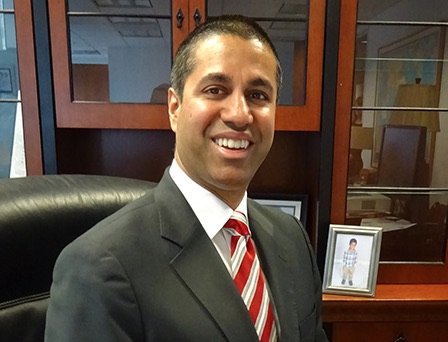Slice of American Pai

The smarter way to stay on top of broadcasting and cable industry. Sign up below
You are now subscribed
Your newsletter sign-up was successful
Ajit Pai is the senior Republican commissioner on the FCC and, if a Republican wins the White House, the likely interim chairman. (That is, unless current chair Tom Wheeler does not follow custom and retains the seat; when prodded by Republican legislators, he has not promised to exit.)
Pai, the son of Indian immigrants, has seen the sausage factory from all angles, working at the Justice Department, on the Hill and at the FCC in an earlier stint in the General Counsel’s office. In fact, Pai calls himself the “Forrest Gump” of the legal profession. That peripatetic course let him to the FCC seat without a plan for that progression, but with the gratitude for the opportunities and the outcome.
Pai talked with B&C Washington bureau chief John Eggerton about being in the minority on the commission, his view of “competition, competition, competition” and a certain up-and-coming lecturer at the University of Chicago Law School that he recalls when he was a student there.
What is your principal concern with the way that the minority commissioners are treated at the FCC in terms of access to information, or responsiveness to your issues and concerns? We know that has been a bone of contention.
It has been an issue. My principal concern is that, the commissioners, who after all have been appointed by the president and confirmed by the Senate and, therefore, are responsible for setting commission policy, aren’t given the full range of information and/or the options that they deserve in order to make an informed decision.
We have seen it time and time again when minority commissioners asked for information from either the chairman’s office or one of the subordinate bureaus, information simply isn’t forthcoming whereas for majority offices typically that information is given without question.
OK, let’s say a Republican wins the White House and you were named interim chairman of the FCC. We assume your mantra would also echo chairman Wheeler’s mantra of “competition, competition, competition.” But, if so, how would you define that differently?
The smarter way to stay on top of broadcasting and cable industry. Sign up below
Certainly, I would say it. But I would also mean it. I would adopt policies that were designed explicitly to promote greater competition in every marketplace in which the FCC has jurisdiction. And with respect to broadband, for example, I would embrace the IP transition to insure that certain telecom carriers don’t have to maintain the fading copper infrastructure of yesterday. They can focus on providing next-generation fiber. I would focus on making sure that wireless Internet service providers had much greater business incentive to deploy infrastructure. That means making the citing of infrastructure easier. That means getting more 5 GHz spectrum out into the marketplace to allow them to deliver better and faster and cheaper Internet access services to their customers.
And I would insure that, where possible, we relax some of the legacy regulations that simply aren’t as necessary in an all-IP world of intermodal competition.
Those are the kinds of things that the current agency has not done that would actually promote competition.
President Obama is the son of an immigrant and went to Harvard Law and taught at the University of Chicago Law School. You are the son of an immigrant, went to Harvard undergrad and went to Chicago Law School.
I still remember seeing him in the hallways when he was teaching there. He was a relatively young lecturer at the time. There was a lot of buzz about him even then, though I don’t think anyone would have foreseen he would be the president of the United States.
Did you have him as a professor?
I didn’t. My recollection was that he was teaching upper-level courses on things like election law and, I believe, a constitutional law seminar.
And yet from seemingly similar experiences you have very different political philosophies. What in your experiences as a minority growing up in America led you to the Republican Party?
For me, one of the things that really influenced the development of my political views was watching my parents’ example.
They came to the United States in 1971 literally with nothing more than a transistor radio, ten dollars and a willingness to work extremely hard. From buying dishes at Goodwill in Buffalo in the early 1970s to my mother making glue with rice, which I still remember from when I was in preschool, I saw the fact that they were willing to do literally anything for me and my sister to have an opportunity to succeed.
Contributing editor John Eggerton has been an editor and/or writer on media regulation, legislation and policy for over four decades, including covering the FCC, FTC, Congress, the major media trade associations, and the federal courts. In addition to Multichannel News and Broadcasting + Cable, his work has appeared in Radio World, TV Technology, TV Fax, This Week in Consumer Electronics, Variety and the Encyclopedia Britannica.

